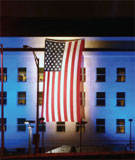AT&T Inc. has announced a new contract to deliver a custom mobility solution to the Governor's Division of Emergency Management for the state of Texas.
Last month, this column addressed HSPD-20, which mandates government agencies to appoint a senior official at the assistant secretary level as continuity of government coordinator to prepare plans, budgets and exercises to test continuity planning, preparation and capability.
- By Col. Timothy D. Ringgold
- Dec 01, 2007

San Diego draws millions of tourists every year and is home to miles of beautiful beaches and luscious scenery. But just like any large city, law enforcement must constantly wage battle against an ever-growing number of criminals.
- By Brent Dirks
- Nov 29, 2007
A professor at The University of Texas at Austin has received $1.9 million to expand a computer model that is already helping guide national decisions about placement of devices to detect nuclear smuggling attempts.

How can the government better protect its military assets? That is the question that the PSEAG and SEIWG seek to answer.
- By Sandra Freitner
- Nov 27, 2007
Orsus has been awarded a contract for its Situator product suite with the Virginia Port Authority.

Today’s airports are at the frontline of homeland security. Checking for shoe bombs, banned liquids and suspected terrorists are part of the daily routine for airport security personnel. In fact, airport vulnerability has become such an issue that the Department of Homeland Security assigns the airline industry its own threat level designation. For example, airports can be assigned to threat level orange, meaning “High Risk of Terrorist Attacks” while the rest of the nation is at yellow, or “Elevated Risk.”

Going through airport security can be such a hassle. Shoes, laptops, toothpastes, watches and belts all get taken off, taken out, scanned, examined, handled and repacked. But "T-rays", a completely safe form of electromagnetic radiation, may reshape airport screening procedures.
Gemalto's vice president urged DHS and congress to make privacy and data security the highest priorities in ID programs.
The Coast Guard has a difficult assignment -- securing more than 95,000 miles of America’s coastal borders.
- By Ralph C. Jensen
- Nov 20, 2007

Soon after 9-11, Americans wondered aloud: How did our guardians miss the clues? Suspects on watch lists had moved money in curious ways. “Chatter” had risen in recent months. A visitor to the country had offered cash to learn how to fly -- but not land --- a jetliner. In hindsight, these telltale nuggets provided evidence of the terror to come.
Catcher Holdings Inc. has successfully deployed its soon-to-be acquired Vivato Networks' broadband wireless solution to the Los Lunas, N.M. public safety services.

IBM has started a new project with the City of Chicago office of emergency management and communications (OEMC) to implement an advanced city-wide intelligent security system.

Avineon Inc. recently announced the release of Avineonics, an information system that enables organizations to automate the preparation, organization, management, execution and documentation of emergency preparedness and incident management functions.
A tiny sensor that can detect magnetic field changes as small as 70 femtoteslas -- equivalent to the brain waves of a person daydreaming -- has been demonstrated at the National Institute of Standards and Technology (NIST). The device may have applications such as homeland security screening for explosives.

Cyberspace has infused the lives of people across the country. Its latest victim: Michael Chertoff, secretary of the Department of Homeland Security.
- By Karina Sanchez
- Nov 05, 2007
We’ve written about it often and talked about the what ifs, including if somehow, someone was to breach security checkpoints at a nuclear facility.
- By Ralph C. Jensen
- Nov 05, 2007
The federal government is a master at applying pressure to get what it wants. It is doing just that to Washington, D.C., and its suburbs in preparation for developing extensive evacuation plans. Nothing like this has taken place since the Cold War, but officials are mapping escape routes, stockpiling bedding for shelters and designating pickup points for those without a car.
- By Ralph C. Jensen
- Nov 05, 2007
The Department of Homeland Security today released Appendix A of the Chemical Facility Anti-Terrorism Standards (CFATS), a critical element of its chemical security efforts.
Last May, the White House issued Homeland Security Presidential Directive 20, HSPD-20, which mandates government agencies to appoint a senior official at the assistant secretary level as their continuity of government coordinator to prepare plans, budgets and exercises to test continuity planning, preparation and capability.
- By Col. Timothy D. Ringgold
- Nov 01, 2007